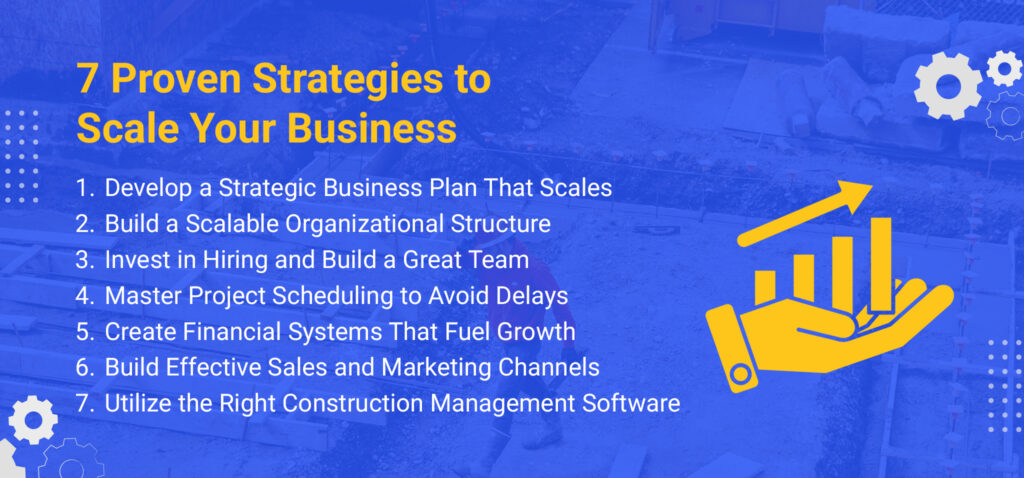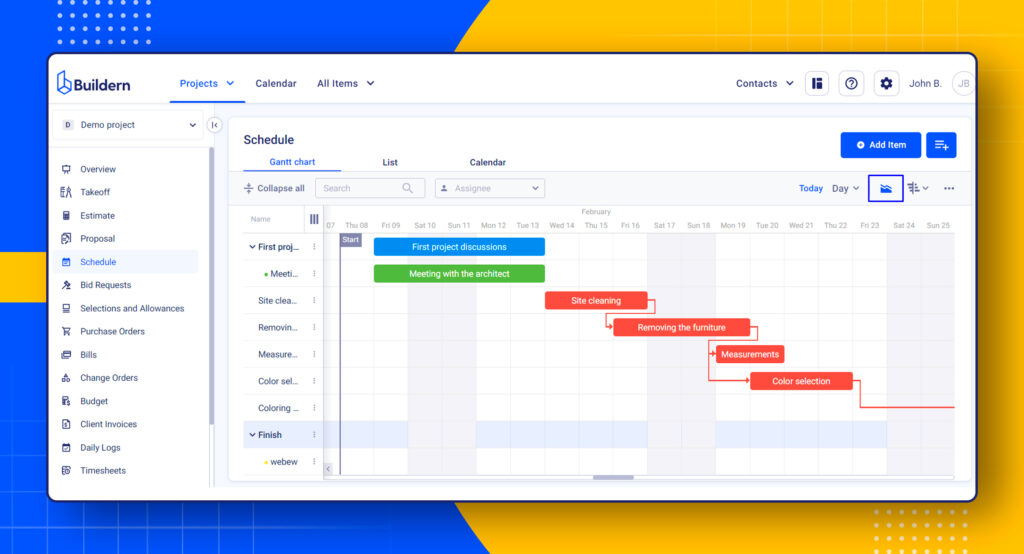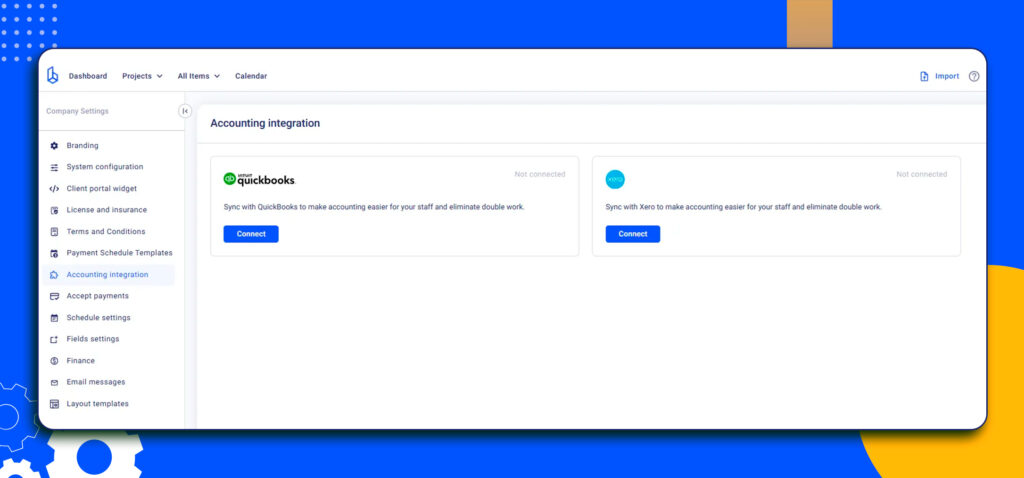How to Scale a Construction Business in 2026: 7 Proven Strategies

Published April 10, 2025. Updated October 24, 2025
Do you have a construction business but don’t know how to scale it effectively?
Growing a construction business without a plan is like building a house without a foundation. You may make some progress, but it won’t last long.
Scaling is not just about getting bigger projects or more clients, but most importantly, about improving how you operate. When you prioritize every detail, from choosing an effective project management model to the right technology stack, you lay the foundation for long-term success.
It all starts with accurate estimating, effective project management, and clear communication across your team. In my blog article, I will show how to scale a construction business in 2026 and build a foundation for long-term growth.
Table of Contents
- What is Scaling and Why Does It Matter?
- 7 Proven Strategies to Scale Your Business
- Develop a Strategic Business Plan That Scales
- Build a Scalable Organizational Structure
- Invest in Hiring and Build a Great Team
- Master Project Scheduling to Avoid Delays
- Create Financial Systems That Fuel Growth
- Build Effective Sales and Marketing Channels
- Use the Right Construction Management Software
- Bottom Line

What is Scaling and Why Does It Matter?
Any business wants to win more projects, but not everyone understands that a long-term strategy is more important than a short success. Scaling a construction business means growing your company in a strategic and sustainable way.
Understanding how to grow a construction business is essential because scaling without a plan is not a sustainable strategy. It should not be a growth for the sake of growth, like hiring more personnel and spending more resources on ads.
A well-scaled construction business is an organized structure that is increasing revenue and maintaining profitability, not compromising on client satisfaction. From theory to practice, let me show the strategies that work best.
7 Proven Strategies to Scale Your Business
Without a clear strategy, you are just using occasional chances to grow, not building for the long term. As a contractor, I can land a big project here or get a great referral there, but that’s reactive growth. You end up constantly chasing the next opportunity instead of creating systems that bring opportunities to you.
Scaling doesn’t have to be overwhelming. With the right strategies in place, you can grow your business deliberately without burning out or sacrificing quality.

#1 Develop a Strategic Business Plan
Creating a winning business strategy is not easy. Yet, a carefully considered business plan can help you identify and focus on your company’s goals. A thorough construction business plan will offer you a strategic direction for your business and will simplify financial management.
Don’t rush to draft your business plan immediately. Before you begin, ask yourself the following question, which will guide you to develop a comprehensive business plan:
- What are my company’s values?
- What services do I offer within the construction industry?
- What is my unique selling proposition?
- Who is my target market?
- What are my short-term and long-term business goals?
- What resources, equipment, or employees do I need?
- How much growth in net profitability do I expect?
Once you have answers, it’s time to outline the key components of your strategic business plan.
Company Values
Define the ideals that guide your business decisions. These are the ideals that guide every business decision you make, from which projects you take on to how you treat your team and clients.
Goals
Identify your goals by visualizing where you want your business to be in five or ten years. Paint a clear picture of what success looks like for you. It’s not only about the financial indicators, but also the niche and direction you want to develop.
Strategic Initiatives
You’ll also need to identify strategic initiatives, which are the key actions that should be taken to drive business growth over the coming year.
Annual Performance Metrics
Establish your annual performance metrics. Decide which numbers truly define success for your business: revenue targets, project completion rates, client satisfaction scores, or profit margins. These metrics will help you track progress and make informed decisions along the way.
#2 Build a Scalable Organizational Structure
A clearly defined organizational structure is essential when scaling your organization’s business. It allows you to improve your company’s workflow and accountability while minimizing the risks of miscommunications, especially when the team structure changes.
When building an organizational structure for your business, consider choosing either a flat (simple construction hierarchy), a functional (by department), or a divisional (by project) structure.
#3 Invest in Hiring and Build a Great Team
It’s also important to understand your staffing needs and identify if those should be internal hiring of construction workers or if they need to be outsourced. When there is a decision, define each of your employees’ roles and responsibilities so that you do not have any overlaps. Establish a reporting relationship and outline who reports to whom to avoid miscommunications within the team.
According to research from the Associated General Contractors of America, labor shortages affect 1/3 of all construction firms and are the leading cause of project delays. Thus, investing in your hiring processes is essential, as it will guarantee higher engagement, job satisfaction, and long-term business growth.
From my experience, I can say that a well-structured organization allows you to improve operational efficiency and have better employee performance.

#4 Master Project Scheduling to Avoid Delays
In construction, things can change even within minutes. As a result, managing multiple projects, crews, or timelines becomes increasingly difficult. Without proper schedule management in place, every small project delay can cause disruption, leading to financial hurdles.
For efficient scheduling, I use our tool that can manage a project schedule without any difficulty. You can sync your people, tasks, and schedule in one place, and organize multiple projects from start to finish, ensuring efficiency across office and in-field teams.

#5 Create Financial Systems That Fuel Growth
The financial side is important when you think about how to scale a construction business. Planning your budget properly and managing your cash flow, starting from a pre-construction stage, is important. To mitigate the risk of negative cash flow, review your budget constantly, try cash flow forecasting, and set a clear payment schedule.

As you take these steps and your financial activity increases, integrated accounting becomes vital. With the accounting integrations tool, like QuickBooks and Xero, you can easily sync expenses, estimates, and invoices seamlessly.
With strong accounting, you will have full financial visibility of your projects, ensuring that your construction company is ready to scale.
#6 Build Effective Sales and Marketing Channels
Building effective sales and marketing channels is your ultimate chance to raise awareness about your construction business. In fact, construction marketing plays a key role in helping companies stand out in a competitive industry and build long-term trust with clients.
To build an effective sales and marketing channel, consider the following:
- Identify your ideal client persona
- Build a website and work on SEO
- Promote your brand through social media marketing (SMM)
- Set measurable goals
- Use analytics and tracking tools
- Seek testimonials and case studies
Implementing these strategies will optimize your in-field and online construction brand presence, attract clients, and even attract potential hires.
#7 Use Construction Management Software
Another way to scale your business is to use construction management software. The more you scale your operations and the larger your business grows, the more challenging it is to keep track of dozens of projects and budgets.
Given the speed at which technology is advancing, it would be foolish to rely on manual data entry and manual calculation. The company will hardly stay competitive without automation, as these processes take much time.
Meanwhile, construction software starts from the estimating stage to change orders and communication during the entire project.
Bottom Line
Scaling a construction business is not a one-time process. It is a long-term one that requires strategic planning and execution. True growth means building a business that doesn’t just operate well at the start, but runs efficiently across all levels.
When investing in foundations, you will manage to constantly grow without sacrificing quality. Ultimately, scaling is not about doing more of what you already do but about doing what you do better.
Remember: Growth doesn’t happen overnight, but with the right systems in place, it becomes inevitable

How Long Does it Take to Scale a Construction Business?
There’s no magic timeline for scaling a construction business. It depends on the goals you want to achieve. Some contractors see meaningful progress within 12-18 months; others may need several years to build a truly scalable operation. What is clear, it will not open overnight, especially if you lack a strategy and a structured approach.
What’s the Difference Between Growing and Scaling a Construction Business?
Growing a construction business often means simply taking on more projects and hiring more people. Scaling, on the other hand, is a strategic growth, increasing your revenue while improving operational efficiency so you’re not just working harder, but smarter. A scaled business has systems and processes in place to handle more work without compromising on quality and client satisfaction.
Should a Contractor Invest in Marketing to Scale a Construction Business?
Of course, you can, but do not start immediately from advertising. Build a website, raise brand awareness through social media. Track which channels bring you the best quality leads and invest more heavily in those. Referrals have traditionally been a driving force of construction businesses, so you can use them in your marketing strategy as well.


